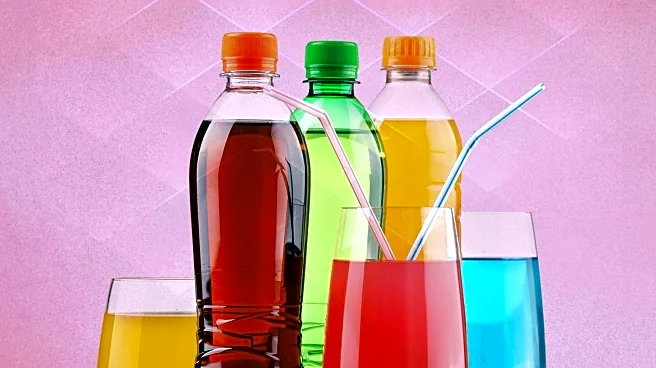What is the story about?
What's Happening?
Recent research presented at United European Gastroenterology Week 2025 has found a significant link between the consumption of low- or non-sugar sweetened beverages and an increased risk of developing metabolic dysfunction-associated steatotic liver disease (MASLD). The study analyzed data from 103,251 participants in the UK Biobank, revealing that consuming more than 250 grams of these beverages daily increased the risk of MASLD by 60%, compared to a 50% increase for sugar-sweetened drinks. The findings suggest that even beverages marketed as healthy alternatives may negatively impact liver health.
Why It's Important?
The study's findings are crucial as they challenge the perception of low-sugar drinks as healthier alternatives to traditional sodas. With MASLD linked to serious health issues such as liver scarring, heart disease, and diabetes, the research highlights the need for consumers to critically evaluate their beverage choices. The potential impact on public health is significant, as these drinks are widely consumed under the assumption of being beneficial. This could lead to increased healthcare costs and a reevaluation of dietary guidelines concerning beverage consumption.
What's Next?
Further research is needed to understand the mechanisms by which low-sugar drinks affect liver health. The study's authors suggest that these beverages may alter gut microbiomes or stimulate insulin secretion, contributing to metabolic disruption. As the findings gain attention, there may be increased scrutiny from health organizations and potential changes in marketing practices by beverage companies. Consumers might also become more cautious, leading to shifts in purchasing habits and demand for clearer labeling on beverage products.
Beyond the Headlines
The study raises ethical questions about the marketing of low-sugar drinks as healthy options. It underscores the importance of transparency in food labeling and the need for regulatory bodies to ensure that health claims are substantiated by scientific evidence. Additionally, the findings could influence cultural attitudes towards diet sodas and similar products, prompting a broader discussion on the role of artificial sweeteners in modern diets.
















